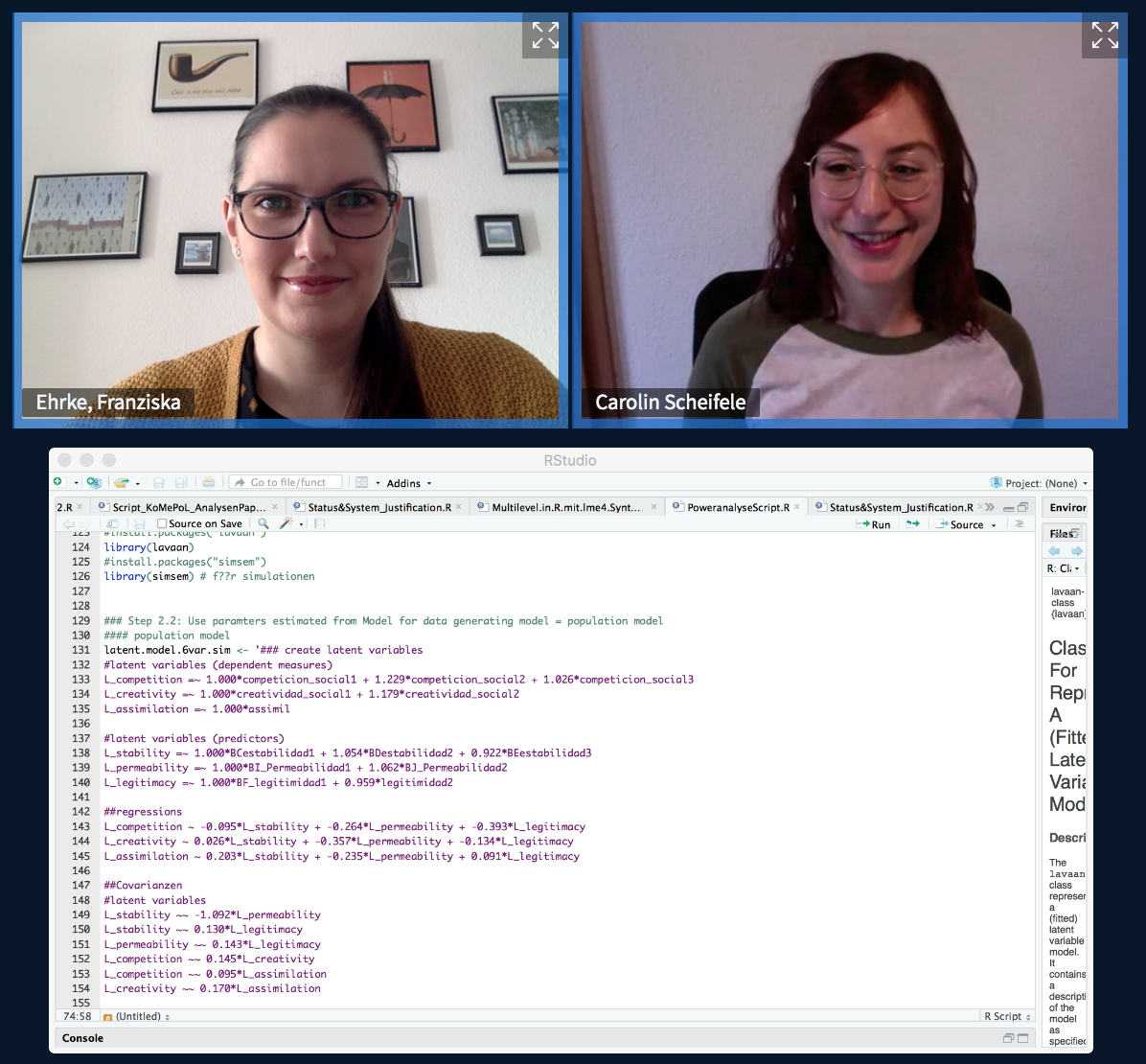Pre-registered Research Grant Report by Franziska Ehrke, Carolin Scheifele, & Team
11.12.2020, by Tina Keil in grant report
Franziska Ehrke (Universität Koblenz-Landau, Germany), Carolin Scheifele (KU Leuven, Belgium), Maria Angels Viladot (Universitat Oberta de Catalunya, Spain), Colette van Laar (KU Leuven, Belgium), Melanie C. Steffens (Universität Koblenz-Landau, Germany)

Testing the basic socio-structural assumptions of social identity theory in the gender context: Evidence from correlational studies on women’s leadership
Comparisons with other groups are used to maintain or obtain positive social identities. If the outcome of such comparisons is negative (i.e., if the ingroup is low in status and regarded negatively by others), unsatisfactory social identities result. To restore a satisfactory social identity, people engage in certain processes and strategies. Social identity theory (SIT, Tajfel & Turner, 1979) postulates three possible alternatives: individual mobility, social competition, and social creativity. The strategy adopted depends on the perceived legitimacy of the intergroup relation, its perceived stability, and the perceived permeability of group boundaries (Tajfel, 1982). There have been surprisingly few empirical tests of these postulates in the context of one of the most central group identities: gender.
Women have increasingly participated in the labor force since the 1960s, with a current share of 39% of female workers worldwide and around 46% in Spain and Germany (Fullerton, 1999; World Bank, 2019). However, this improved labor force gender ratio is not reflected at the managerial level. Globally, women account for 24% of senior roles (Grant Thornton, 2018), and lead 3% of Fortune Global 500 companies (Hinchliffe, 2019). As one striking example, women run fewer of the largest companies in the US than men named John (Wolfers, 2015). Applying SIT to the context of women in leadership, women can develop a negative social identity based on the realization that women have less successful careers than men in leadership. Women should thus be motivated to regain a positive social identity by embracing any of the three identity-management strategies (Williams & Giles, 1978). Although researchers have applied SIT to gender relations (e.g., Ellemers, 2001), a full examination of SIT’s basic assumptions in the gender context is missing.
In the context of female leadership, we therefore examined whether identity-management strategies depend on structural perceptions as postulated by SIT. Our main hypotheses were that social competition results if permeability, legitimacy, and stability are all perceived to be low. Social creativity results if permeability is perceived to be low, but stability and legitimacy are perceived to be high. Individual mobility results if permeability is perceived to be high. A pilot study with N = 649 female leaders in Spain yielded strong support for the relations predicted regarding the strategy of social competition. However, little empirical support was found for SIT’s predictions regarding social creativity or mobility. Especially for individual mobility, results contradicted predictions (e.g., lower, instead of higher, permeability was related to individual mobility).
To better understand these so far mixed results, we aimed to re-examine the relations predicted by SIT in a different national context and improve the measurement of the socio-structural constructs and identity-management strategies. We prepared a registered report planning to recruit N = 649 female leaders in Germany. After our manuscript has been reviewed and revised, our pre-registered report has received an in-principle acceptance by the European Journal of Social Psychology (the pre-print at Stage 1 is available here: https://onlinelibrary.wiley.com/doi/abs/10.1002/ejsp.2678). We are currently in the process of finalising the analyses and will resubmit Stage 2 of our manuscript by the end of this year. The EASP Pre-registered Research Grant covered the costs of two research assistances that helped recruiting a considerable number of female leaders in Germany. We thank the EASP for its generous funding and for implementing a grant that supports pre-registered research. We also thank Safira Qazi and Louise Fröhlich for their help with recruiting our participants.
References
- Ellemers, N. (2001). Individual upward mobility and the perceived legitimacy of intergroup relations. In J. T. Jost & B. Major (Eds.), The psychology of legitimacy: Emerging perspectives on ideology, justice, and intergroup relations (pp. 205–222). Cambridge University Press.
- Fullerton, H. N. (1999). Labor force participation: 75 years of change, 1950-98 and 1998-2025. Monthly Labor Review, 122(12), 3–12.
- Grant Thornton. (2018). Women in business: Beyond policy to progress. https://www.grantthornton.global/globalassets/1.-member-firms/global/insights/women-in-business/grant-thornton-women-in-business-2018-report.pdf
- Hinchliffe, E. (2019). Women lead only 2.8% of Fortune Global 500 Companies: The Broadsheet. https://fortune.com/2019/07/22/women-lead-only-2-8-of-fortune-global-500-companies-the-broadsheet/
- Tajfel, H. (1982). Social psychology of intergroup relations. Annual Review of Psychology, 33, 1–39. https://doi.org/10.1146/annurev.ps.33.020182.000245
- Tajfel, H., & Turner, J. C. (1979). An integrative theory of intergroup conflict. In W. G. Austin & Worchel (Eds.), The social psychology of intergroup relations (pp. 33–47). Montery, CA: Brooks Cole.
- Williams, J., & Giles, H. (1978). The changing status of women in society: An intergroup perspective. In H. Tajfel (Ed.), Differentiation between social groups: Studies in the social psychology of intergroup relations. Academic Press.
- Wolfers, J. (2015). Fewer women run big companies than men named John. https://www.nytimes.com/2015/03/03/upshot/fewer-women-run-big-companies-than-men-named-john.html
- World Bank. (2019). Labor force, female (% of total labor force). https://data.worldbank.org/indicator/SL.TLF.TOTL.FE.ZS